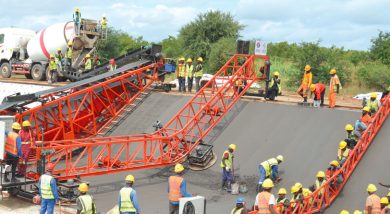Cyclone stirs cholera worries
Malawi’s worst cholera outbreak has left Penjani Chunda with little time to rest.
Every day, the Blantyre district environmental health officer receives reports and visitors to strategise how to stop the fast-spreading disease.
During the meeting around 9am, he was dispatching teams and essential medical supplies to cholera hotspots.
However, his job got harder when Cyclone Freddy triggered severe landslides and flash floods that displaced thousands, with over 100 people confirmed dead and about 30 missing in Blantyre.
Animated by early warnings from the weather department, ambulance teams swiftly evacuated all cholera patients from health centres to Queen Elizabeth Centre Hospital (QECH) to reduce the potential deaths, injuries and damages.
When the cyclone struck, the health workers focus switched from the raging outbreak that has claimed 1 750 lives from about 57 000 confirmed cases in a year, to the influx of wounded patients and bodies from areas devastated by the cyclone.

“It was hectic and we had no time to adjust. We had to deal with two related emergencies that are devastating in the community where we work,” says Chunda.
The cyclone strained the healthcare system already grappling with a high disease burden, including the polio resurgence, Covid-19 pandemic and raging cholera emergency.
“It wasn’t easy to deal with the double blow, but teamwork always wins,” explains Chunda.
He coordinates disease surveillance, prevention and control in all 37 health centres in Blantyre, the worst-hit district by both cholera and Cyclone Freddy. He marshalled the emergency transfer of cholera patients to an isolation facility that housed Covid-19 patients in 2020.
Chunda adds: “The cyclone affected the cholera response, including treatment units that were pulled down after the patients had been evacuated to QECH where we already had a camp fit for the purpose. Despite the horrifying disaster, no camp fell on a patient.”
The cyclone has stirred a surge in cholera cases in Blantyre just when the national disease burden is falling.
“The numbers are rising sharply due to a breakdown in access to safe water, sanitation and hygiene at a time we expected the double-digit counts to fall below 10,” Chunda says.
Blantyre’s preventive health teams also suspended a nationwide community outreach to vaccinate people against cholera and Covid-19.
Chunda states: “To us, the surge is a cause of worry. We expect a worse outbreak since the cyclone destroyed water and sanitation facilities in affected areas.
“This is a double blow because it is happening amid a cholera outbreak sparked by last year’s cyclones. We need urgent support to protect the devastated communities and remind them of the importance of insisting on safe water, sanitation and hygiene.”
The affected population requires soap for hand-washing, buckets for water storage, chlorine for water treatment and public awareness, especially on preventive measures.
The Ministry of Health has deployed community health workers to all emergency evacuation camps to conduct health talks and chlorination in a desperate effort to roll back the cholera eruption among over 565 000 displaced people.
Camps in Blantyre have confirmed about 10 cholera patients within weeks, including in Mpingwe, Manja and Mbayani.
“The good news is that the spread has been kept under control, but this confirms our fears that poor sanitation and hygiene could turn the overcrowded camps into super-spreaders of cholera,” Chunda warns.
Equally worried is community nurse Maria Malele, one of the health workers who worked day and night to save the lives of cholera patients amid the humanitarian crisis caused by Cyclone Freddy.
Her work in the 43-bed cholera treatment centre at QECH just got harder.
“Our workload increased dramatically with the cyclone. Few hands had to care for an increasing number of patients as many health workers turned to assist casualties from disaster zones,” she narrates.
For weeks, she has been knocking off late, especially when there are many patients.
“Ours is a calling, so we cannot live with patients because it is time to clock out,” she explains. “The workload can only get bigger unless the resurgent cholera wave is kept in check, especially in crowded camps with limited access to safe water, hygiene and sanitation.”
Mariam Andrea was taken ill by cholera at Mbayani Camp. After spending five days at the main cholera treatment camp amid the battering cyclone, she returned to the facility when her two sets of twins contracted the sanitation-related bacterial disease.
She recounts: “I was vomiting and experiencing high fever and diarrhoea. My husband took me to Chileka health centre, but I had fallen unconscious when an ambulance evacuated me to the treatment centre at QECH.
“People hit hard by the cyclone are at a high risk of dying from cholera if they don’t get lifesaving support such as soap for hand-washing, water treatment chemicals, preventive messages and business financing so that they can leave the crowded camps to rebuild their homes and sanitation facilities.”
Andrea thanks “hardworking health workers” for saving her life and children.
“They served me well, “ she says.
And Chunda calls for renewed action to end cholera.
He states: “Sanitation and hygiene should be a priority with or without a disaster. The double tragedy is preventable if we learn to heed preventive measures just as our teams averted the likely deaths and injuries by heeding early warnings to evacuate over 10 patients from fragile camps.”





